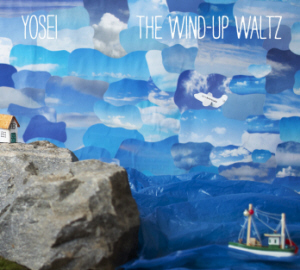Pádraic Grant posted on August 17, 2010 19:00
A review of the album 'The Wind-Up Waltz'by Yosei
 Review Snapshot: A beautifully restrained album, an exercise in the art of cool playing and the emotion that can be generated through the subtle rather than the loud.
Review Snapshot: A beautifully restrained album, an exercise in the art of cool playing and the emotion that can be generated through the subtle rather than the loud.
The Cluas Verdict? 9 out of 10
Full Review: The large number of semi-folk bands present in the alternative music scene is a good thing (for me at least, it being one of my favourite styles of music) their very prevalence can be slightly overwhelming. Working from a similar, constraining stylistic map, a set of clichés have led to a sense of unoriginality creeping in when listening to certain acts. From either deliberately wacky or maudlin introspective lyrics to the standard reliance on either bland minimalism or an over-produced string/horn section, folk bands without new ideas can be enjoyable, but never inspiring.
The Wind-Up Waltz defies this trend. Built on a folk foundation laced with jazz influences, the latter heard intermittedly in both the rhythm and instrumentation of the album, the combination is a consonant one, one genre trope complimenting the other. In this respect Yosei keep their sound fresh and different from other orchestral folk acts. Their sound evokes an updated take on the jazz-folk fusion of acts like Pentangle or Wooden-O, a tendency that is sadly overlooked in the scene.
Opening with “The Raven,” Lina Lagendorf’s voice sets the tone of the entire work – measured but engaging. The same song also makes it clear that this album is truly thought-out and performed to a tee; the interplay between the instruments is crafted superbly, the flute solo that tops it off sober and well-placed.
While the jazz influence is a strong one, as previously mentioned another inspiration is early 70s folk. This can be heard in “The Raven,” but “Lily” trumps that song, with flute lines reminiscent of the best bands of the Joe Boyd milieu. Alongside these, Lagendorf’s voice has the qualities of Linda Perhacs or Shelagh McDonald.
A constant shifting of mood pervades the album, with “Fisherman’s Song” an exemplar of this trait. Dusted with eerie, shimmering instrumentation, the song flits between contradictory feelings of solitude, threat and romantic awakening. While the narrator relates a story of loneliness and the accidental arrival of a shipwrecked sailor, the instruments move behind her, switching from ethereal backing to more assertive rhythms as the song moves from verse to chorus.
The Wind-Up Waltz stands as an album that remains interesting despite its almost constant lulled-out tempo. That the band achieves this through subtle mood change and invocation of the cool and collected approach to composition, rather than succumbing to the temptation of over-orchestration, makes listening all the more enjoyable. Utterly charming, the only complaint that holds any muster is that the laid –back sound can start to sound a little monotonous, the very subtly that makes the album so intriguing also contributing to its biggest flaw. But this is a small complaint, almost entirely forgettable when set against the refined beauty of The Wind-Up Waltz. Yosei’s greatest challenge now is how to strike the balance between retaining their current style of writing and refraining from stagnation. Their next work, then, will be fascinating because of both that task and the promise of yet more pleasurable listening to come.
Pádraic Grant
More ...
[Read More...]